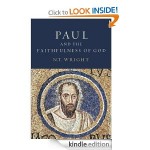Wright explores what Schweitzer was perhaps the first to call the mysticism of Paul. He does so in the larger context of early Jewish mysticism which focused on “penetration of the secrets of creation and cosmology on the one hand and gazing on the vision of the God enthroned on his chariot (as in Ezek. 1) on the other” (p. 415). Only now when Paul ‘sees’ God he has the face of Jesus, indeed he sees the glory of God in the face of Jesus (2 Cor. 4.4– I suspect this is an allusion to what he saw on Damascus Road). In other words, there has been a Christological redefinition of both monotheism and mysticism, with Christ taking the place of personified Wisdom in hymn material in Col. 1 and elsewhere. Wright sees this as a reversal of the mysticism ascending, with instead the messiah descending. I must disagree. 2 Cor. 12 still talks about the mystical ascent into the heavens.
Nonetheless, Wright is correct that Paul saw himself as a prophet (see e.g. 1 Cor. 14), indeed a prophet announcing the fulfillment of previous prophetic oracles. “That is why he so easily and naturally slips into Jeremiah 1 when referring to his ‘call’ from God” (p. 416). He also sees himself as the herald of Isaiah as well, proclaiming and making straight the paths for the Lord. But the story of both God and his people had been reconfigured by the death and resurrection of Jesus, which brings the story to its climax. Rom. 15.8-9 brings up an interesting point. Christ became a servant of the circumcised, Paul unto the confirmation of the promises to the patriarchs.
What promises to which patriarchs are we talking about? Surely, what Paul has in mind is the promises to Abraham, Issac, and Jacob/Israel. What he does not have in mind is promises made to Moses or in the Mosaic covenant. It will be remembered that Gal. 4 makes clear that the Mosaic covenant was a temporal or interim solution until Christ came. When Paul says Christ is the ‘seed’ of Abraham, he is linking the Abrahamic covenant with its promises to Abraham, to Christ. And so here are well in Rom. 15. When Paul sets up the exemplar of faith in Gal. 3 and Rom. 4, it is to Abraham he points. When he wants to set up a covenantal contrast in 2 Cor. 3-4, it is between the ministry of Moses, and his own ministry which focuses on Christ.
It is precisely here, in the understanding of how Paul views covenants, and covenantal theology that I think Tom goes somewhat awry, with his focus on Deut. 30-31 and on fulfillment of the Mosaic covenant. Jesus did not come to be Israel but rather to free Israel. Being ‘the incorporative seed’ of Abraham is not the same thing as being the later incorporated Israel.
Israel in Rom. 9-11 is non-Christian Jews, which God still has a plan to free, in and through Christ, at the eschaton. Yes, the new eschatological people of God are Jew and Gentile united in Christ, and yes that is the goal and final form of God’s people, but for now there still is an Israel outside of Christ, and Paul says that after the full number of Gentiles come in, then, when the Redeemer returns from Zion, and by grace and through faith in their Messiah, then that Redeemer will turn away the ‘impiety of Jacob’ and ‘all Israel’ will be saved (in the future), by which he means a very large number of Jews will turn to Christ when he returns and raises the dead. Before then, there is only a righteous remnant or root of Israel within the ‘ekklesia’ the eschatological assembly of God’s people.
One of the essential premises of Wright, which he shares with Richard Hays, is the assumption that at least some of the Pauline audience was deeply steeped in Scripture, and indeed had access to the Scriptures, otherwise Paul is speaking above their heads and beyond their abilities. It is not clear to me this is always the case. Rom. 9-11 is deeply steeped in OT texts. Deliberately so. Paul is shaming the Gentile Christians (see Rom. 11) who think they’ve got it figured out but do not know the Scriptures all that well. And if it is correct to say Jewish Christians are meeting separately from these Gentile Christians in Rome, then this segment of that discourse is meant to honor them and shame the Gentiles into realizing they need their Jewish Christian brothers and sisters, and need their help to understand what Paul is saying. Long story short, I think Paul does speak over the heads of a good many of his converts, particularly the Gentiles with little or no synagogue background. It is also not clear to me that he assumes they can simply look it up in their own copy of the Scriptures, though perhaps a Stephanas or a Sosthenes in Corinth, having been a synagogue leader would have some scrolls. And it is especially not clear to me that Paul was lugging around a hug case of scrolls wherever he went. Like Ed Sanders I think he mainly had the Scriptures in a very safe place– in his head and heart. In short, I think my main complaint about the reading of Hays and Wright of Paul in this matter is that they assume too much about Paul’s audiences when it comes to the knowledge of Scriptures, especially when we are not dealing with quotes that a few literate Jewish Christians might look up for the benefit of the group, but the numerous echoes and allusions found in Paul’s letter which I doubt many were catching. Paul has a Scripture saturated mind (much like John Wesley who spoke Biblese most of the time). His Scripture saturated mind speaks new truths using the Scriptures as part of his discourse. He does not expect them to pick up the pieces and go back and track down allusions like a good doctoral student. He expects them to makes sense of the new whole, the new patchwork quilt he is speaking now, which has something old and something new in it. It is this new combined inspired speech they must make sense of. We should not see the congregations of Paul as like a later Scriptorium or even like a modern Bible study. They did not have a NT yet, and it is not clear to me that they even had a good deal of the OT ready to hand either in some of Paul’s churches. What they had is the Gospel, the Good News, whatever it may have borrowed, quoted, or used from previous revelations. And it is that which they have believed and embraced. When I read, for example 1 Corinthians, and hear about the praxis in Corinth, what I never hear is…. “and now its time to read from the OT during our worship service”. What I do know is that Paul’s letters are read out, as the inspired text to that congregation. In short, I think Hays and Wright have over-egged the pudding when it comes to how much they assume that the largely Gentile Pauline churches knew and even had access to large quantities of the OT. When Paul finally clears his throat and talks about early Christian worship he talks about: 1) prayer; 2) singing hymns and songs; 3) sharing spiritual gifts; 4) sharing the oral sacred traditions about the last supper and other aspects of the Jesus story (including his death and res.– 1 Cor,. 15); 5) reading out loud the latest Pauline letter in worship. What I find missing is the recitation of the OT or reference to the study of the OT, or the need to go back and search the Scriptures more. This was the praxis of a later age of Christianity when they had a large pile of both Christian and OT texts (chiefly the LXX) ready to hand, and many scribes making many copies of the whole. It is the praxis of the church after the apostolic age, as far as I can tell. Of course there were likely some exceptions, some Jewish Christians who did do such OT study, and did share things with their fellow Christians. They did not all have to be able to have or read scrolls to get the benefit of one or two persons who did and shared.














